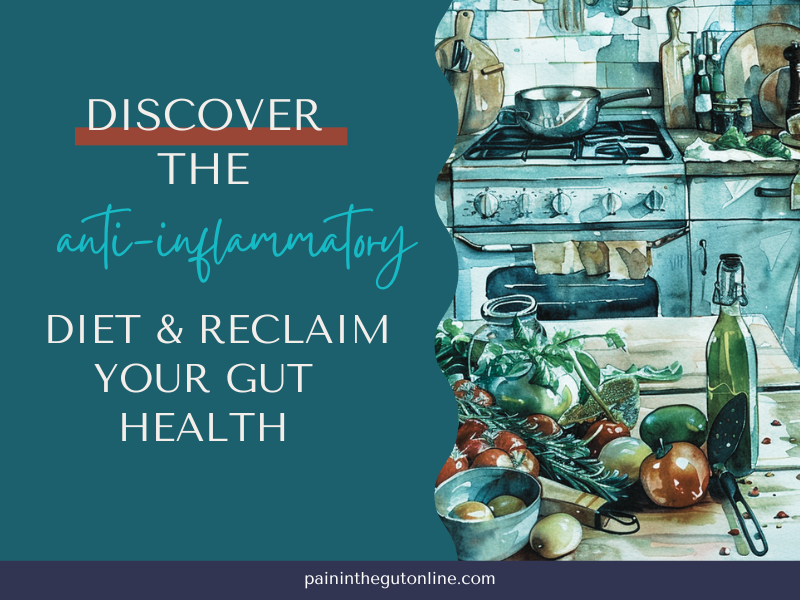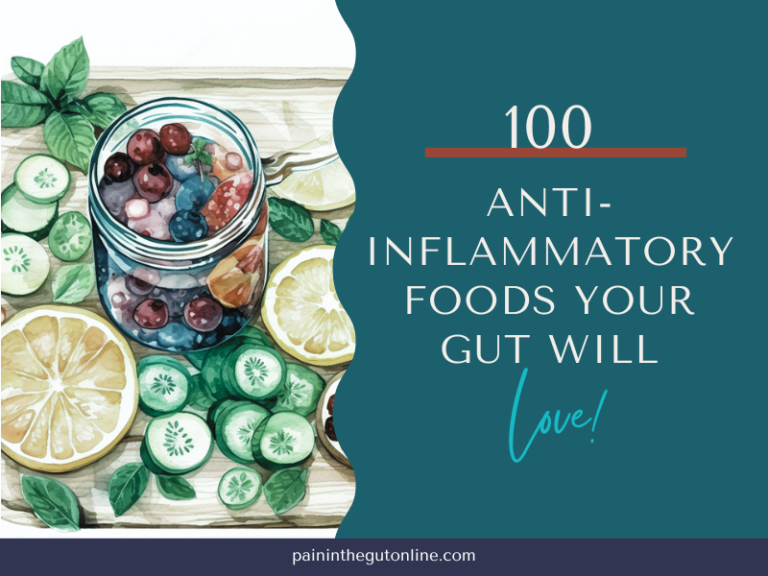ANTI-INFLAMMATORY DIET FOR GUT HEALTH
8 min read/ 1,692 words
Reclaim gut health with an anti-inflammatory diet for a happier tummy! Discover the power of foods that soothe inflammation.

Table of Contents
Understanding Inflammation
To reclaim your gut health, it’s important to understand the role of inflammation in your overall well-being. Inflammation is a natural response by your immune system to protect your body against harmful stimuli, such as infections or injuries.
However, when inflammation becomes chronic, it can harm your health.
Role of Inflammation in Health
Inflammation plays a crucial role in your body’s defense mechanism.
It helps to fight off pathogens, repair damaged tissue, and initiate the healing process. When you have an injury or infection, your immune system releases chemicals that trigger blood flow to the affected area, resulting in redness, swelling, and warmth. This acute inflammation is a necessary process for your body to recover.
Impact of Chronic Inflammation
While acute inflammation is a normal and essential response, chronic inflammation can have serious consequences for your gut health and overall well-being. Prolonged and low-level inflammation has been linked to a range of chronic diseases, including cancer, heart disease, diabetes, arthritis, depression, and Alzheimer’s.
Several factors contribute to chronic inflammation, including lifestyle choices, stress, environmental toxins, and most importantly, diet.
Certain foods can promote inflammation in the body, while others have anti-inflammatory properties that help to counteract the inflammatory response.
To combat chronic inflammation and improve your gut health, it’s important to adopt an anti-inflammatory diet.
This diet focuses on consuming foods that help to reduce inflammation and promote overall health. By incorporating these foods into your diet, you can support your body’s natural ability to heal and prevent inflammation-related chronic diseases.
In the next section, we will delve into the basics of the anti-inflammatory diet, including the benefits of anti-inflammatory foods and the specific foods you should include in your diet to support your gut health. Stay tuned to discover the power of nutrition in reclaiming your gut health!
Anti-Inflammatory Diet Basics
Incorporating an anti-inflammatory diet can be highly beneficial to reclaiming your gut health and reduce inflammation.
An anti-inflammatory diet focuses on consuming foods that help combat chronic inflammation, which is often linked to major diseases such as cancer, heart disease, diabetes, arthritis, depression, and Alzheimer’s (Harvard Health Publishing).
You can support your gut health and overall well-being by making intentional food choices.
Benefits of Anti-Inflammatory Foods
Anti-inflammatory foods play a significant role in reducing inflammation and preventing chronic diseases associated with inflammation.
They contain whole vegetables, fruits, herbs, spices, plant-based proteins, anti-inflammatory fats, complex carbohydrates, and green, black, and white teas (GI Society). These foods are nutrient-dense and rich in vitamins, minerals, fiber, essential fatty acids, and phytonutrients that promote optimal health.
The benefits of incorporating anti-inflammatory foods into your diet include:
- Reducing inflammation: Anti-inflammatory foods help combat chronic inflammation, which can lead to various health complications.
- Supporting gut health: The nutrients found in anti-inflammatory foods promote a healthy gut environment, supporting the growth of beneficial gut bacteria and enhancing overall digestive function.
- Boosting immune function: Anti-inflammatory foods contain antioxidants and other immune-supporting compounds that help strengthen your immune system and protect against infections and diseases.
- Maintaining healthy weight: Many anti-inflammatory foods are low in calories and high in fiber, helping you feel fuller for longer and supporting weight management.
- Improving heart health: An anti-inflammatory diet, particularly one that is rich in fruits, vegetables, and healthy fats, can help reduce the risk of heart disease by lowering cholesterol levels and supporting cardiovascular health.
Foods to Include in Your Diet
When following an anti-inflammatory diet, it’s important to focus on consuming a variety of nutrient-dense foods.
Some key foods to include in your diet are:
- Vegetables: Incorporate a wide range of colorful vegetables such as leafy greens, broccoli, bell peppers, tomatoes, and sweet potatoes. These vegetables are packed with vitamins, minerals, and antioxidants that help fight inflammation.
- Fruits: Enjoy a variety of fruits such as berries, citrus fruits, apples, and pears. These fruits provide essential nutrients and antioxidants that support your overall health.
- Whole grains: Opt for whole grains like quinoa, brown rice, oats, and whole wheat bread. They are rich in fiber, which aids in digestion and helps reduce inflammation.
- Healthy fats: Include sources of healthy fats such as avocados, olive oil, nuts, and seeds. These fats are known for their anti-inflammatory properties and provide essential fatty acids.
- Plant-based proteins: Incorporate plant-based protein sources like legumes (beans, lentils, chickpeas), tofu, tempeh, and edamame. These proteins are low in saturated fat and high in fiber, making them excellent choices for an anti-inflammatory diet.
- Herbs and spices: Add flavor to your dishes with anti-inflammatory herbs and spices like turmeric, ginger, garlic, cinnamon, and rosemary. They not only enhance the taste of your meals but also provide additional health benefits.
By including these anti-inflammatory foods in your diet, you can support your gut health, reduce inflammation, and promote overall well-being.
Remember to consult with a healthcare professional or registered dietitian before making any significant changes to your diet. For more information on anti-inflammatory foods for gut health, refer to our article on anti-inflammatory foods for gut health.
Foods to Avoid or Limit
When following an anti-inflammatory diet to promote gut health and inflammation, it’s important to be mindful of the foods that can contribute to inflammation in your body.
Avoiding pro-inflammatory food choices can help reduce chronic inflammation and support your overall well-being. Here are some foods to steer clear of:
Pro-Inflammatory Food Choices
- Simple and Refined Sugars: Foods high in refined sugars, such as sugary drinks, desserts, and processed snacks, can trigger inflammation in the body. To combat chronic inflammation, it’s important to limit your intake of these sugary treats.
- Unhealthy Fats: Trans fats, which are commonly found in processed and fried foods, have been associated with increased inflammation. It’s best to avoid foods that contain trans fats and instead opt for healthier fats like olive oil, avocados, and nuts.
- Charred Foods: While grilled or barbecued foods can be delicious, consuming charred foods in large amounts can contribute to inflammation. The charring process produces harmful compounds that may have pro-inflammatory effects. To minimize the risk, limiting your consumption of charred or burnt foods is advisable.
- Excessive Alcohol: Alcohol in excessive amounts can lead to inflammation in the body. Limit your alcohol intake and enjoy it in moderation to support gut health and reduce inflammation.
- Conventional Corn-Fed Meat and Dairy: Conventionally raised meat and dairy products from animals that are fed a diet primarily composed of corn can contain higher levels of pro-inflammatory omega-6 fatty acids. Opt for grass-fed or pasture-raised meat and dairy products, which tend to have a healthier fatty acid profile.
- Processed Food Chemicals and Artificial Sweeteners: Many processed foods contain additives, preservatives, and artificial sweeteners that can trigger inflammation in some individuals. To minimize inflammation, it’s wise to choose whole, natural foods and minimize the consumption of heavily processed products.
Effects of Unhealthy Food on Inflammation
Unhealthy food choices not only contribute to weight gain and the risk of chronic diseases like type 2 diabetes and heart disease, but they are also linked to excess inflammation in the body.
Research suggests that Western-type dietary patterns high in processed meats, saturated fat, refined sugars, and low in fiber, nutrients, and phytochemicals are associated with metaflammation and increased blood markers of inflammation (Harvard T.H. Chan School of Public Health).
By avoiding pro-inflammatory food choices and opting for a diet rich in anti-inflammatory foods for gut health, you can help reduce chronic inflammation and support a healthy gut. Remember, making small changes to your diet can significantly impact your overall health and well-being.
Enhancing Gut Health
Understanding the role of gut microbiota and the impact of diet on the gut barrier is important for improving gut health and reducing inflammation.
Gut Microbiota and Inflammation
The gut microbiota, a complex community of microorganisms in your gastrointestinal tract, is crucial in maintaining your gut health and immune function.
Dysbiosis, an imbalance in the gut microbiota, has been associated with conditions such as irritable bowel syndrome (IBS) and chronic inflammation. Dysbiosis can affect gut mucosal homeostasis, immune function, metabolic regulation, and visceral motor function, leading to various gastrointestinal symptoms.
Incorporating anti-inflammatory foods into your diet is key to promoting a healthy gut microbiota and reducing inflammation.
These foods, such as fruits, vegetables, whole grains, fatty fish, and nuts, provide essential nutrients and bioactive compounds that support a balanced gut microbiota and help combat inflammation.
Impact of Diet on Gut Barrier
The gut barrier, composed of a single layer of epithelial cells lining the intestinal wall, protects against harmful substances and pathogens. A compromised gut barrier can increase intestinal permeability, allowing harmful substances to enter the bloodstream and trigger inflammation (source).
Your diet plays a significant role in maintaining the integrity of the gut barrier.
A fiber-rich diet, such as the Mediterranean diet (MD), has been associated with beneficial effects on gut microbiota and improving symptoms in conditions like IBS. The MD, which includes high-fiber whole grains, fruits, vegetables, nuts, legumes, and fish, has anti-inflammatory effects and promotes a healthy gut environment.
Limiting the intake of fermentable oligosaccharides, disaccharides, monosaccharides, and polyols (FODMAPs) may be beneficial for individuals with IBS. A low FODMAP diet has been shown to improve overall IBS symptoms, including visceral pain and bloating. However, the long-term effects on the gut microbiota and clinical outcomes require further research (source).
By adopting a diet that supports a healthy gut microbiota and promotes a strong gut barrier, you can enhance your gut health and reduce inflammation.
Don’t forget to consult with a healthcare professional or registered dietitian before making any significant changes to your diet. They can provide personalized guidance and help you create an optimal anti-inflammatory diet plan for your specific needs.
Did you know there’s more to improving your gut health than just what you eat?
Gut health has five key areas essential to keeping your gut healthy.
Those five areas are:
- Nutrition
- Sleep
- Stress Management
- Movement/Exercise
- Hydration
We can help! Check out our Focus on Five Bundle for Gut Health and start working toward better health and a happier you today!






